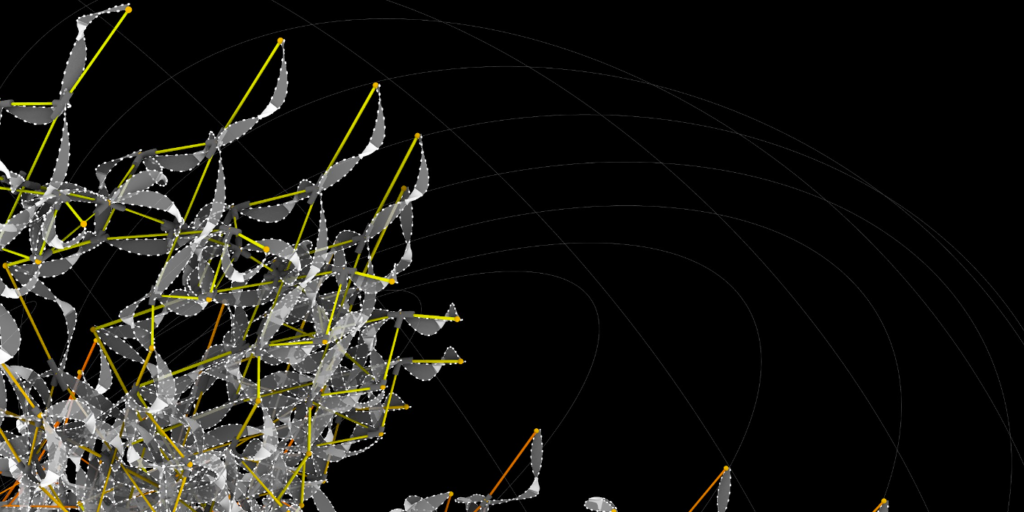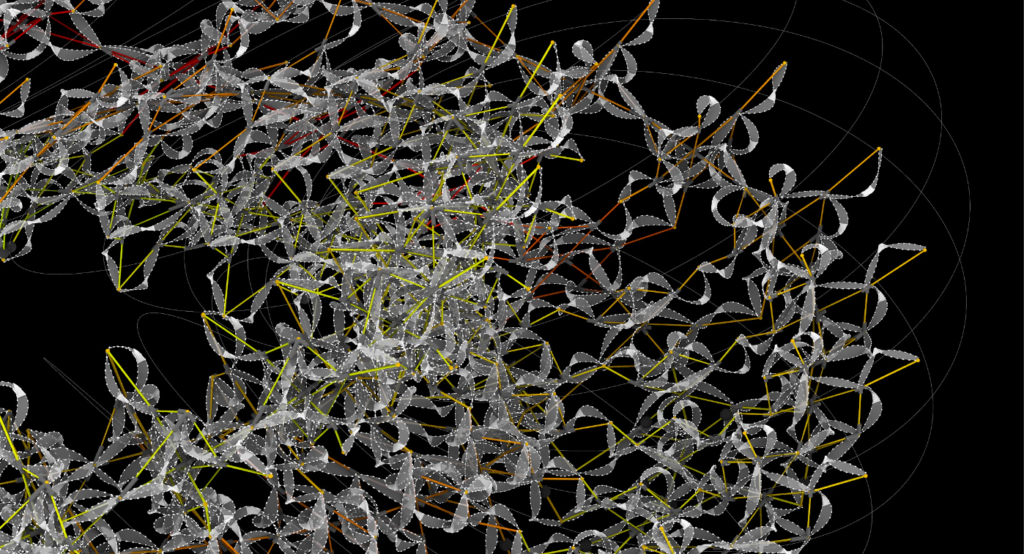Beyond Static – Exploring Machine Learning for adaptive geometries in expandable structures
Instructors: Hesham Shawqy / Esther Rubio Madronal
Dates: July 24, July 25, July 26
Themes: AI / Geometry /Structures
Software: Rhino / Grasshopper
Number of Students: 30
Workshop registration open until filled

Description:
Beyond Static is a workshop that utilises machine learning to explore the relationship between geometry, modular networks, and motion.
Focusing on adaptive geometries, this workshop delves into the realm of dynamic, responsive, and kinetic structures. We will explore how modularity can enhance the flexibility, scalability, and adaptability of the system. Participants will learn how to harness modular design principles to create expandable and reconfigurable systems, enabling structures to respond to changing needs and environments.
We will begin by defining how a base element behaves under certain forces, using then this element as the base to create a local module. Participants will study its control parameters and how forces alter its state and shape. Once we have established a solid understanding of the individual module, we will proceed to construct a global system by aggregating these modules. Within this system, each module’s state will be determined by a multitude of factors, including internal interactions and external influences.
The brief encounters the challenge of visualizing the design space of a model defined by multiple parameters. Machine learning will be employed to analyze and leverage the extensive range of variations within the design system. This application aims to improve and optimize the generative design modeling system by exploring its potential through machine learning techniques.
Through short theory sessions followed by a hands-on exercise and interactive discussions, attendees will gain a deep understanding of the iterative design process and its applications in architecture. By the end of the workshop, we would have collectively created a global system and participants will be encouraged to develop their own proposals.

Learning Objectives :
– Exploring iterative structures and patterns using Recursive systems
– Utilizing the advantages of using Modularity design rules
– Assemblies and component integration in the design space
– Understanding and manipulating Surface typology
– Integrative Dynamic Vectors and movement in design
– Refining and optimizing generative design modelling through the utilization of machine learning
Detail Schedule :
Monday 24th (10:00 – 13:00 GMT+1) 10Introduction – Generative Design System – Recursive Modeling – Modularity Design Rules
Tuesday 25th (10:00 – 13:00 GMT+1) Surface Typology – Global Design System – Assembly Rules
Wednesday 26th (10:00 – 13:00 GMT+1) Introduction to Machine learning applications in AC – Integrating ML models – Finalizing the case study – closing
Monday 29th (10:00 – 13:00 GMT+1) Participants online submissions
Instructors:

Hesham Shawqy:
Hesham Shawqy is an architect, and computational designer, focusing on computational design, artificial intelligence, and web development. He is currently working at Grimshaw, London as a computational design specialist. Hesham is also leading the Complex Forming seminar in the MACAD program. Recently he has been working at IAAC as a research assistant working on machine learning models deployments. Hesham received his Master’s degree in Advanced Computation for Architecture & Design in 2021. His research interests focus on digitizing handcrafts using Machine learning and robotic fabrication. In the past, he worked as an individual consultant on a range of design projects ranging from product design, historical documentation, urban development, museums, products, exhibitions, and housing.

Esther Rubio Madronal:
Esther is a Computational Design Specialist and trained architect. She is a member of Design Technology at Grimshaw, where she develops computational tools and workflows, working alongside the design teams with complex geometry modelling and rationalisation. Before joining Grimshaw in 2022, Esther was one of the founding member of the 3D-Team at GB.Schneider, a specialist facade contractor. As opposed to the role of computational designer at the architectural scale, Esther focused on the manufacturing and fabrication scale, fully automating the creation of highly detailed 3D models which were then directly used for production. Esther is a tutor at Oxford Brookes University. She has previously organised and delivered workshops at Westminster Architectural School and ACADIA 2022, ranging from fabrication to data driven approach for urban design and master planning.


